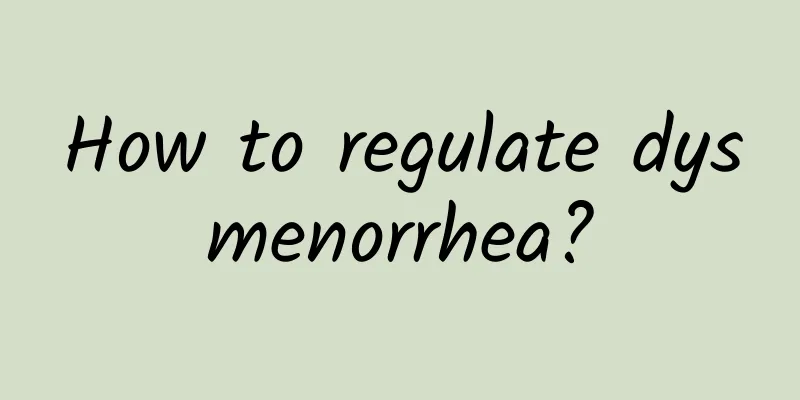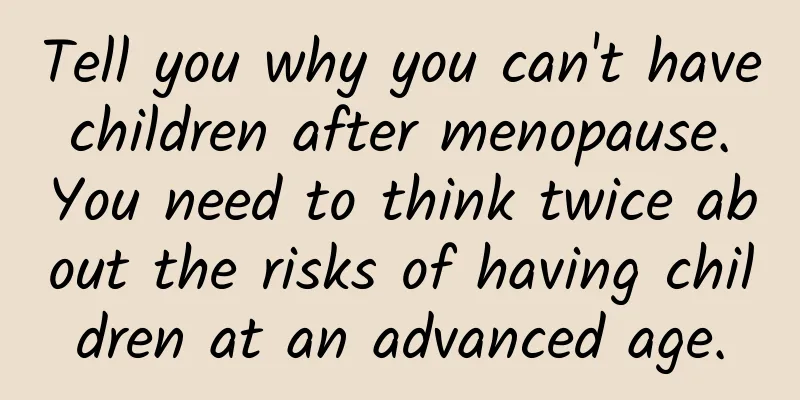Why do women's private parts have "spasms"? Don't panic, understand these 5 common problems first

|
In the clinic, I met a girl named Xiaomei. She shyly told me that every time she was intimate with her partner, her private parts would always "cramp" involuntarily, which made her embarrassed and painful. This reminded me that many women may have had similar experiences, but they are too embarrassed to talk about them. Today, let us understand the truth about female private parts "spasm" so that everyone will no longer be embarrassed! Female private parts "spasm"? Don't be afraid, let's talk about these 5 secrets first! Vaginismus, also known as sexual intercourse fear syndrome, refers to the spasmodic contraction of the female vaginal opening muscles during sexual intercourse, which makes it impossible for the penis to be inserted into the vagina normally, causing pain in the female perineum. There are usually several reasons: Excessive tension in the pelvic floor muscles Just as we unconsciously clench our fists when we are nervous, women's pelvic floor muscles also contract involuntarily when they are nervous or afraid. This may be the cause of "cramps" during sexual intercourse. Relaxation and pelvic floor muscle training, such as Kegel exercises, can help improve the condition. Psychological factors Psychological factors such as sexual anxiety, fear, and past traumatic experiences can all lead to "cramps". Sometimes, psychotherapy and psychological counseling are the key to solving the problem. When the mind is soothed, the body will naturally relax. 【Physical discomfort】 Physiological problems such as gynecological inflammation, vaginal dryness, and hormonal changes may also cause discomfort in the private parts and lead to cramps. Regular gynecological examinations, maintaining private hygiene, and using lubricants when appropriate are all good ways to prevent it. 【Muscle spasm disease】 Rarely, pelvic floor muscle spasms may be a sign of a disorder such as vaginismus. If conventional methods do not work, it is recommended to seek professional medical help, which may require medication or physical therapy. Sexual skills and communication Lack of sexual knowledge and skills, or insufficient communication between partners, may also lead to "cramps". Learning correct sexual techniques, communicating honestly with your partner, and exploring comfortable ways together are the basis for building a harmonious sex life. Dear female friends, private part "spasm" is not a strange disease. It may just be the body telling us that we need more attention and understanding. So, will female private part spasms affect the couple's life? Vaginal spasm, also known as vaginismus, is an involuntary, strong contraction of the vaginal muscles during sexual intercourse or vaginal examination, which can make intercourse difficult or painful. The condition of female private part spasms may lead to decreased sexual desire, affect the quality of sex life, and may even cause tension in the relationship between couples. To alleviate the adverse effects of private spasms on sexual desire, you can take the following measures: Get enough sleep: Making sure you get enough sleep every night is important for managing stress and anxiety. Moderate exercise: Participating in moderate physical activity, such as jogging or yoga, can help you relax and unwind. Active lifestyle: Maintain good eating habits and consume foods that are beneficial to your physical and mental health. Psychotherapy: Psychological counseling and sexual counseling can help promote the relationship between couples and reduce disharmony. Professional Medical Assistance: If emotional stress is causing seizures, seek professional medical assistance immediately. Through the above methods, the adverse effects of private part spasms on sexual desire can be effectively alleviated, maintaining a healthy physical and mental state. Many friends are curious, does emotional stress really have a big impact on women’s sexual desire? Emotional stress can have a significant impact on a woman's sexual desire. Sexual desire is a complex physiological and psychological process that is affected by multiple factors, including physiological state, psychological state and environmental factors. Emotional fluctuations, especially negative emotions such as anxiety, tension, and stress, may cause the body's stress response, causing increased heart rate, increased blood pressure, sweating, etc. These reactions may have an adverse effect on sexual desire. When women feel negative emotions such as anxiety, tension, stress, fatigue or depression, it may affect their sexual desire and sexual feelings. These emotions may lead to problems such as decreased libido, painful intercourse, or difficulty orgasming. Conversely, when women feel positive emotions such as pleasure, relaxation, confidence, and comfort, it may increase their sexual desire and sexual feelings. Long-term psychological stress may also cause the cerebral cortex to inhibit the function of the hypothalamic-pituitary-gonadal axis, which manifests as a decrease in interest and desire in sexual activity, thereby affecting the individual's quality of sex life and interpersonal relationships. Additionally, emotional stress may exacerbate symptoms of chronic pelvic pain and primary dysmenorrhea. Please remember that if you feel overly stressed or emotional problems are affecting your daily life, it is very important to seek professional help. A professional psychologist or doctor can provide appropriate guidance and support to help you better manage your emotions and stress. Remember, no matter what problems you encounter, you don’t have to be afraid. Be brave to understand and solve them. Just like Xiaomei, now that she has started her own recovery journey, I believe she will become more and more confident and enjoy a better life. You can do it too! Note: This article aims to popularize health knowledge. If the article is helpful to you, please like and follow it! |
Recommend
Are the large blood clots coming from uterine fibroids?
Are the large blood clots coming from uterine fib...
What should patients with cervicitis pay attention to? There are 4 measures to treat cervicitis. Please save it.
The uterus is a special physiological organ of wo...
Three major hazards of hyperprolactinemia to women
The harm of hyperprolactinemia is difficult to es...
Nursing record of hyperprolactinemia
How to care for and treat hyperprolactinemia? Hig...
Daily care for ovulation bleeding
Many women are probably familiar with the ovulati...
What to do if pelvic inflammatory disease recurs
Pelvic inflammatory disease is a terrible nightma...
Is the left ovarian cyst 52.39 serious? How to treat it?
Left ovarian cysts have no obvious clinical manif...
How to prevent hyperprolactinemia in daily life
Clinically, infertility caused by hyperprolactine...
Is the cure rate of spontaneous abortion caused by malnutrition high?
Most pregnant women will experience vomiting, som...
What medicine should I take if I have frequent urination caused by uterine fibroids? What medicine should I take if I have frequent urination caused by uterine fibroids?
Uterine fibroids are a common benign tumor in wom...
How to treat uterine fibroids effectively
What is the best way to treat uterine fibroids? U...
People who are more likely to have an ectopic pregnancy
For pregnant women, the most worrying issue is th...
Everyone needs to know the symptoms of ectopic pregnancy
Ectopic pregnancy is a common disease, and patien...
What to eat during pregnancy to prevent uterine fibroids from growing? What to eat during pregnancy to make uterine fibroids smaller and smaller
What to eat during pregnancy to prevent uterine f...
Can vulvar pruritus be treated?
Vulvar pruritus can be treated, but the treatment...









